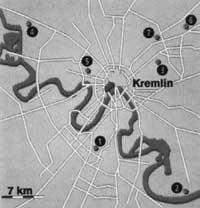Moscow fears radiation
“If the forty nuclear reactors operating in Moscow are not closed, an immediate accident will occur.”
This phrase is by Vladimir KouznetSOV, a nuclear security expert. Its influence has already closed ten nuclear reactors in Moscow.
Compared to Chernobyl, the power of nuclear reactors in the Moscow area is not high, since the largest of these has a power of 40 MW and Chernobyl of 1,000 MW.

All reactors in the Moscow area are used in research and are distributed in seven different locations. One of them, the Kourtchov nuclear physics institute, with 25 nuclear reactors, is located a dozen kilometers from the Kremlin.
These reactors were built in the 1950s and 1960s, when the former Soviet Union intended to equate the US to nuclear. For Vladimir Kouznetsov these nuclear reactors are in very bad condition, that is, the walls of the rooms are cracked, the pipes are exposed to corrosion, there are no safety measures and there is no money to keep them.
When one of the ten previously closed reactors was analyzed, it was observed that the water escaped and that it was collected in a tank without any security measures. These reactors are mainly used by the military, so it is very difficult to fight them. President Boris Jeltsin, after visiting these places, has not been able to make any promises in favor of its closure.
But that is not the only danger that exists in the Moscow area. The proximity of the storage sites of nuclear waste means that all of them accumulate more than 30 million curies, that is, the same as the Chernobyl fuge. In Moscow there are more than 600 high radioactivity points and most scientists and researchers are old and unable to cope with the situation.





